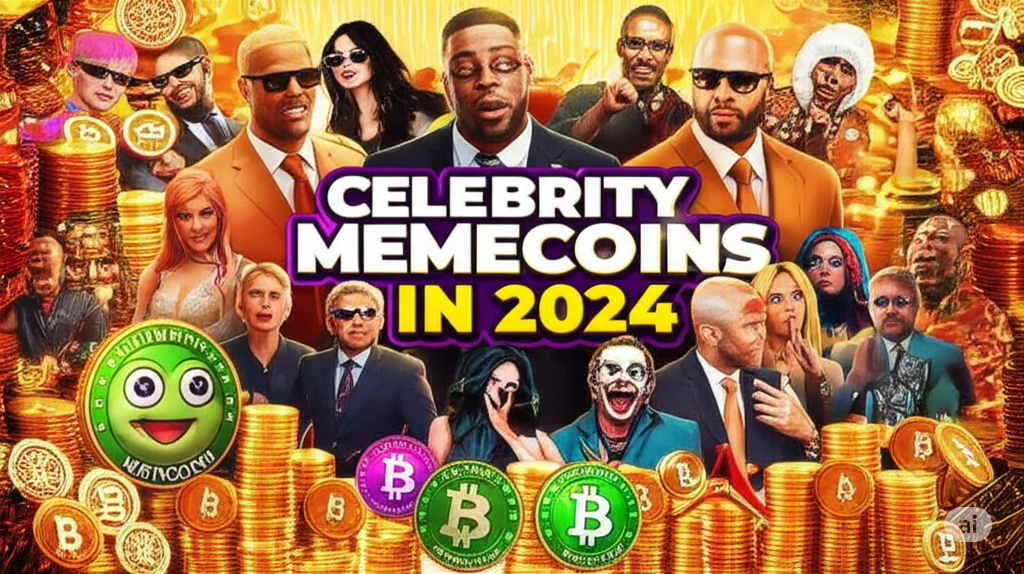Cryptocurrency
Why You Should Never Buy Celebrity Memecoins | Crypto Scams Explained
 In recent years, the cryptocurrency market has witnessed the emergence of a controversial and risky trend — celebrity memecoins. These are digital tokens launched or endorsed by celebrities, often accompanied by flashy social media campaigns and promises of community-building, innovation, or financial opportunity. However, beneath the glamour lies a web of volatility, market manipulation, and, in many cases, outright fraud.
In recent years, the cryptocurrency market has witnessed the emergence of a controversial and risky trend — celebrity memecoins. These are digital tokens launched or endorsed by celebrities, often accompanied by flashy social media campaigns and promises of community-building, innovation, or financial opportunity. However, beneath the glamour lies a web of volatility, market manipulation, and, in many cases, outright fraud.
If you’re considering investing in a celebrity memecoin, this article offers a cautionary deep dive into the risks of investing in memecoins, particularly those linked to influencers and public figures. Citing reputed sources such as Cointelegraph, Moneycontrol, and India Today, we’ll explore why these coins are often far from safe, and how they’ve been associated with crypto pump and dump scams and even securities fraud.
🌟 What Are Celebrity Memecoins?
Celebrity memecoins are digital tokens associated with a public figure, typically promoted on platforms like X (formerly Twitter), Instagram, or TikTok. Some are officially launched by the celebrity, while others simply use their name and likeness (with or without permission). The most popular examples in 2024 included coins linked to Iggy Azalea, Floyd Mayweather, Soulja Boy, and Logan Paul.
Unlike established cryptocurrencies such as Bitcoin or Ethereum, these tokens usually lack utility, transparency, or any real-world application. They rely heavily on hype and celebrity fandom to drive price — not fundamentals or blockchain innovation.
💥 The Rise and Fall of Celebrity Crypto Coins
According to CoinGape and CoinGecko, most celebrity memecoins follow a pattern: initial hype leads to a spike in price, driven by FOMO (Fear of Missing Out) among retail investors. Then, early holders — often insiders — sell off their coins in what is known as a pump and dump scheme.
Case in point:
- In 2023, Kim Kardashian was fined $1.26 million by the SEC for failing to disclose a paid promotion of EthereumMax.
- Logan Paul’s “CryptoZoo” project collapsed amidst allegations of non-delivery and team fraud, with investors losing millions.
- Soulja Boy and Akon were both named in lawsuits related to promoting fraudulent crypto assets.
According to LiveMint and Financial Express, these incidents highlight the increasing regulatory attention on celebrity-endorsed digital assets.
📉 Why Celebrity Memecoins Are a Bad Investment
1. No Real-World Use Case
Most memecoins don’t serve a purpose beyond speculation. They aren’t used for payments, governance, or DeFi protocols. Unlike utility tokens on platforms like Solana or Avalanche, these coins usually exist solely to create buzz and profit insiders.
2. Lack of Transparency
Many celebrity coins are launched without detailed whitepapers, technical audits, or project roadmaps — violating basic principles of crypto due diligence. Retail investors have no insight into token distribution, developer wallets, or project funding.
3. High Volatility and Market Manipulation
As reported by Cointelegraph, many of these tokens are subject to extreme price swings. Early holders or bots pump the price using social media hype, only to dump the token on unsuspecting followers. This often leads to devastating losses for new investors.
4. False Promises and Misleading Marketing
The language used in promoting these tokens often hints at long-term community benefits, partnerships, or metaverse plans — none of which ever materialize. In many cases, the celebrity distances themselves once prices crash.
5. Legal and Regulatory Risks
The Securities and Exchange Commission (SEC), India’s Ministry of Finance, and other regulatory bodies are cracking down on such promotions. In many jurisdictions, failure to disclose paid promotions, or launching unregistered securities, can lead to hefty penalties.
🧠 Why You Should “DYOR” — Do Your Own Research
Investing in cryptocurrency always carries some level of risk. But blindly following celebrity endorsements is one of the most dangerous mistakes in crypto investing. According to MoneyControl, retail investors who jump in without research are most vulnerable to financial losses and scams.
Here’s how you can protect yourself:
- Always read the whitepaper (if available).
- Check for smart contract audits by firms like CertiK or Hacken.
- Look up the project’s developers — are they doxxed and credible?
- Avoid tokens that are solely promoted through influencers and lack external validation.
💼 How Do Celebrity Memecoins Affect the Broader Crypto Market?
While celebrity coins make headlines, they harm the reputation of the broader crypto space. According to Times Now Business, incidents like the CryptoZoo fiasco and EthereumMax promotions have contributed to:
- Increased government scrutiny
- Rising calls for crypto advertising bans
- Negative media portrayal of blockchain innovation
- Investor distrust in decentralized finance (DeFi)
The CoinMarketCap community forum notes that such tokens are often “bad actors” in the ecosystem — causing short-term market volatility and long-term reputational damage.
🔍 The Psychology Behind Buying Celebrity Coins
Why do people buy them, despite obvious red flags?
- Celebrity Worship: Fans trust their idols blindly, assuming they wouldn’t promote harmful products.
- Get-Rich-Quick Mentality: Retail investors believe early adoption of any token could lead to millionaire-level profits.
- Social Media Echo Chambers: Paid bots and influencers amplify hype, creating a sense of urgency and legitimacy.
But remember: celebrity fame ≠ financial expertise.
⚖️ Legal Repercussions and Precedents
In several landmark cases, regulators have cracked down:
- The SEC vs. Floyd Mayweather and DJ Khaled case led to six-figure settlements over unlawful crypto promotions.
- In India, the Advertising Standards Council of India (ASCI) issued strict guidelines on crypto endorsements, mandating clear risk disclaimers.
According to India Today, more regulations are coming — especially around influencer accountability in financial promotions.
🔐 Protecting Yourself from Celebrity Crypto Scams
Here’s a quick checklist before investing in any memecoin:
✅ Is the token listed on reputable platforms like CoinMarketCap or CoinGecko?
✅ Does it have a transparent roadmap and verified team?
✅ Are you relying on influencers rather than independent research?
✅ Have you read third-party audits or community reviews?
If most answers are “no” — stay away.
🏁 Final Thoughts: Don’t Chase Hype — Chase Facts
The idea of getting rich quickly through crypto is tempting, especially when a familiar face is attached to it. But as seen repeatedly, celebrity memecoins are more about manipulation than innovation. Most of these projects are built on hype, not fundamentals — and when the hype fades, it’s the fans and followers left holding worthless tokens.
Cryptocurrency is a rapidly evolving industry with real potential — in DeFi, cross-border payments, smart contracts, and more. But to tap into its benefits, investors must prioritize research, regulation, and reason over celebrity status and social media drama.
📌 Key Takeaways
- Celebrity memecoins are extremely risky and often tied to scams or pump-and-dump schemes.
- Many lack utility, transparency, and real development backing.
- Legal scrutiny is increasing worldwide against misleading crypto promotions.
- Always DYOR (Do Your Own Research) and avoid hype-driven investments.
- Trust reputable sources and data, not influencers.
-

 How to3 weeks ago
How to3 weeks agoHow to Check if Your Tax Consultant E-Verified Your Return Properly
-

 Health3 weeks ago
Health3 weeks agoWhat Happens When You Drink Black Coffee Every Day for 30 Days?
-

 Technology3 weeks ago
Technology3 weeks agoPerplexity AI Now on WhatsApp: Ask Questions, Get Summaries, Generate Images & More
-

 Money3 weeks ago
Money3 weeks agoJSW Cement IPO Opens: GMP, Price, Subscription Status, Review & Should You Invest?
-
![ChatGPT 5 Launched: Who Can Access It, How to Use It & Is It Free? [2025 Guide]](https://www.regularstation.com/wp-content/uploads/2025/08/2DAdWvVdE7ivGpRiqcLMfU-400x240.jpg)
![ChatGPT 5 Launched: Who Can Access It, How to Use It & Is It Free? [2025 Guide]](https://www.regularstation.com/wp-content/uploads/2025/08/2DAdWvVdE7ivGpRiqcLMfU-80x80.jpg) Technology3 weeks ago
Technology3 weeks agoChatGPT‑5 Launched: Who Can Access It, How to Use It, and Is It Free?
-

 Cryptocurrency3 weeks ago
Cryptocurrency3 weeks ago5 Cryptos That Could Challenge Solana (SOL) And Grow Your Portfolio 5000% In 2025
-

 Health3 weeks ago
Health3 weeks agoCoconut Water Isn’t for Everyone: 6 People Who Should Avoid It
-

 Health7 days ago
Health7 days ago5 Best Protein Sources for Vegetarians and Non-Vegetarians






